Eumenes of Cardia. Unusual and atypical diadoch of Alexander the Great
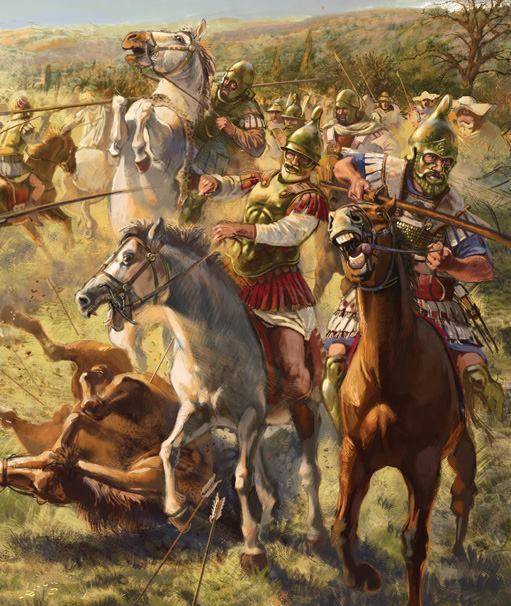
Earlier, we have already talked about the collapse of the empire of Alexander the Great and the division of this failed state between the conqueror's associates, who declared themselves his successors - the Diadochi. More details were given about the most successful of them - Ptolemy Soter and Seleucus Nicator. And today we will talk about the diadoche, the most unusual and clearly distinguished from the general series.
Atypical diadoch
Among the diadochis (successors) of Alexander the Great, Eumenes of Cardia draws special attention to himself.
First, he was a Greek, which greatly weakened his position. Other Diadochi were Macedonians, they knew each other from childhood, they were even considered friends - and this did not prevent them from sincerely hating their rivals. What can we say about some stranger who accidentally "wormed his way" into the ranks of Alexander's closest associates.
Secondly, Eumenes, along with Perdiccas, turned out to be a loyal supporter of the Macedonian Argead dynasty. Moreover, Eumenes is called one of the creators of the cult of Alexander the Great. In 319 BC. e. he, having taken the post of strategist of Asia and commander of the royal army, became the founder of the so-called "empty throne ceremony": he erected a tent with a golden throne, next to which lay the royal regalia and the coat of arms of Alexander. In front of the throne was also placed a golden table with a brazier and a censer. The officials and commanders who gathered for advice bowed to the throne, burned incense and myrrh, thus giving Alexander honors as a god.
Meanwhile, the rest of the Diadochi immediately began to figure out the borders of their own states and with undisguised irritation looked at the nominal kings that interfered with them - the feeble-minded Philip Arrhidaeus, the half-brother of the great conqueror, and the young Alexander, born by Roxana after the death of the Macedonian king. The illegitimate Heracles, whose mother was the Persian Barsina, also interfered with them. In the end, all the descendants and relatives of the great king were killed, including his mother, Olympias.
Thirdly, almost all authors write about Eumenes with great sympathy, sometimes opposing him to other diadochi. So, Duris of Samos, a student of the philosopher Theophrastus, in his work Makedonika, which begins with a description of the death of Alexander the Great's grandfather Amyntas III in the battle of Kurupedion, puts Eumenes on a par with Demosthenes and Phocion. But to other diadochi, he gives simply derogatory characteristics. Duris calls Polyperchon a drunkard, reproaches Antigonus One-eyed with a peasant origin, accuses his son Demetrius of intemperance and striving for luxury, calls Lysimachus a former robber.
Plutarch considered Eumenes one of the great figures of the Greek stories, and Eumenes, the only one of the Diadochi, became the hero of one of his "Biographies" written by him. For comparison with Eumenes, he chose the Marian Quintus Sertorius, undefeated on the battlefield, but killed during the feast.
The Roman historian Cornelius Nepos wrote in his book On Famous Foreign Generals:
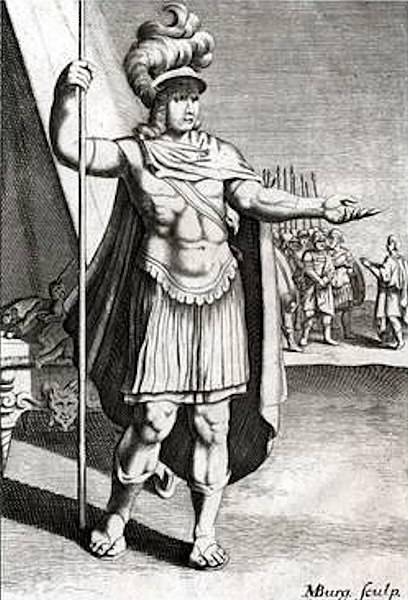
Eumenes of Cardia in the drawing by M. Burg, late XNUMXth century
Let's talk a little about this politician and commander.
Youth
So, the future diadoch Eumenes was a Greek and was born around 362 BC. e. in the small town of Cardia, located on the banks of the Dardanelles. His compatriot, friend, and possibly relative was Hieronymus of Cardia, sometimes referred to as the "historian of the Diadochi".
There are two versions about the passage of Eumenes. According to the first, the future Diadoch came from a very poor family. Duris of Samos in "Macedonika" reports that Eumenes' father was a cart driver. Claudius Elian wrote:
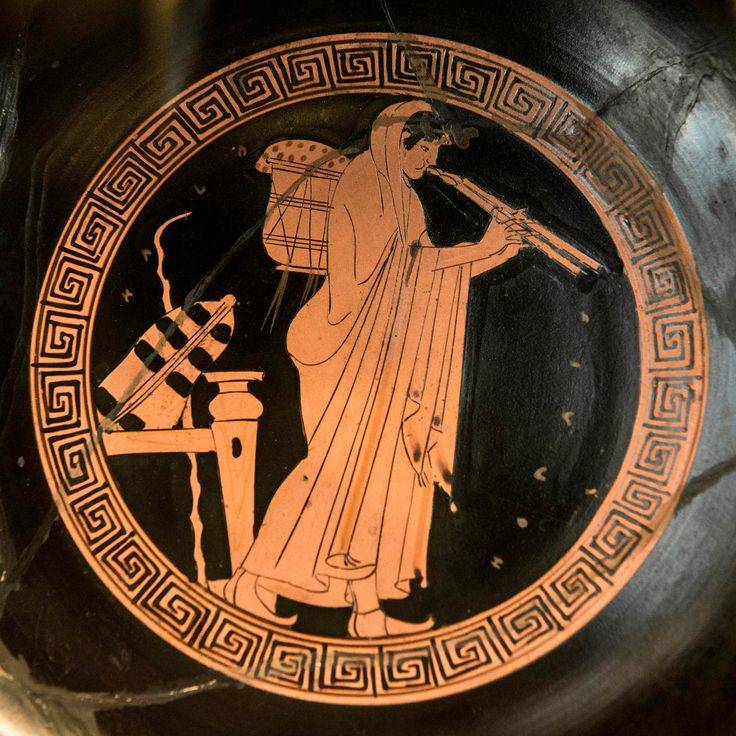
Avletist, image 480–490 BC e. Louvre
But Jerome of Cardia claims that Eumenes came from a noble family, and his father was connected with the Macedonian king Philip II (father of Alexander the Great) "by bonds of friendship and gratitude." Cornelius Nepos adheres to the same version.
The second point of view seems more reliable, since it is known that the father of Eumenes, having moved to Pella, became one of the close associates of King Philip, and his son, according to some information, even studied with Aristotle along with Alexander, Hephaestion, Ptolemy, Crater and other offspring noble Macedonian families.
Eumenes ended up in Pella in 342 BC. e. The reasons for his family's move to the Macedonian capital are unclear. Plutarch believed that Eumenes' father could have been expelled from Cardia by the tyrant Hecataeus, a hereditary enemy of this kind.
And Duris of Samos says that Eumenes, while still in Cardia, attracted the attention of Philip, who visited this city, having distinguished himself in military exercises in the palestra. That is, even if the father of Eumenes really was a good friend of Philip, this young man took the first step towards the rise on his own and without outside help. However, the Macedonian king brought him closer to him not as a bodyguard or commander of one of the military units, but as a secretary: Cornelius Nepos reports that Eumenes was in this position from 342 BC. e. until the assassination of Philip II.
Eumenes' successes in this field, apparently, were so obvious that he retained his position under Alexander, who a few months later appointed him head of his office - archigrammat. Other associates of Alexander contemptuously called Eumenes a "Greek scribe", but Cornelius Nepos reports that the man who held the position of archigrammat was "initiated into all the secrets of the state." Many Western historians refer to Eumenes as Alexander's chancellor.
Archigrammat of Alexander the Great
Eumenes was responsible for Alexander's correspondence and the royal archives, compiled the texts of decrees, and also kept a kind of journal - "Ephemerides", which outlined the official version of Alexander's deeds. Only fragments of the Ephemeris have survived.
For example, those that in 319 BC. e. Antipater, who did not like the rumors about the "moral degeneration" of Alexander, who fell under the spell of Persian traditions, and about the poisoning of this king, ordered the publication of the diadochus by Antipater. The spread of such rumors was related to Antipater's own sons - the royal butler Yoll (and therefore he was suspected of poisoning Alexander) and especially Cassander, whom the king once beat his head against the wall in a fit of anger. The fact is that the young man, brought up in Hellenistic traditions, laughed at the sight of the courtiers falling at Alexander's feet. Here is how this episode is presented in Oliver Stone's film "Alexander":
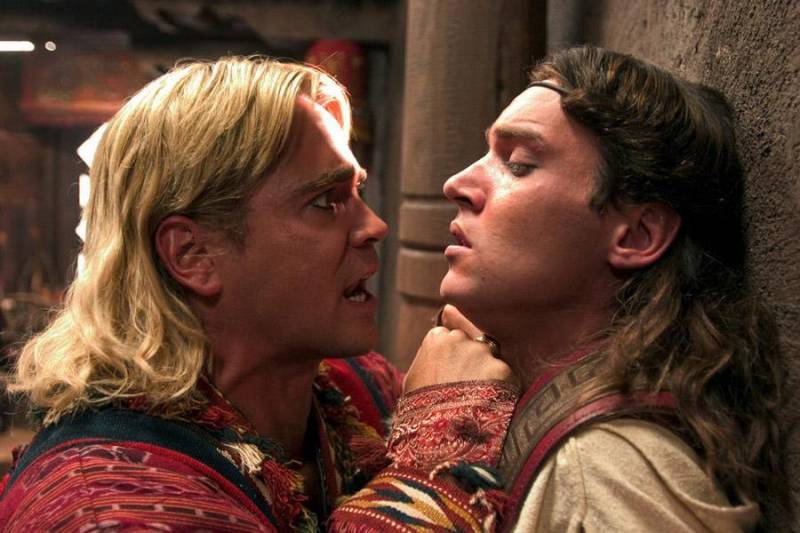
Cassander and Alexander, frame from O. Stone's film, 2004
Since then, Cassander hated Alexander and was so afraid of him that many years later, already being the king of Macedonia and subjugating Hellas, he almost fainted when he saw his statue in Delphi (the sculptor, apparently, managed to convey the appearance of the conqueror well and reliably). It was on the orders of Cassander that the relatives of the great king would then be killed - his mother Olympias, widow Roxana and son Alexander.
But let us return to Eumenes and his Ephemerides.
It is believed that one of the copies ended up in the possession of Ptolemy I Soter and became an important source for his book on Alexander the Great, which the first ruler of Hellenistic Egypt wrote shortly before his death.
Eumenes was also a member of the royal council, which included somatophylaks (literally translated as bodyguards, including, for example, Perdiccas, Ptolemy, Lysimachus, Leonnatus, Peucestes, Python), as well as Alexander's closest friends - Hephaestion and Krater.
And Eumenes was also responsible for supplying the Macedonian army during its campaigns - from food and fodder to weapons, wagons, pack and draft animals. They say that he divided his subordinates into two groups: the first had to give a forecast of needs, the second were responsible for the practical implementation of supply plans.
The importance and indispensability of Eumenes is also evidenced by the fact that he retained his position, despite the hostile attitude towards him of Hephaestion, who had a huge influence on Alexander. It is curious that after the death of the royal favorite, Eumenes contributed a large amount of money to the construction of his tomb and offered to make contributions to other associates of the king. By this he earned the gratitude of Alexander, but not of other future Diadochi, who were not at all pleased with the initiative of Eumenes.
Eumenes is considered Alexander's like-minded person in his "Asiatic" policy aimed at rapprochement between Hellenic and Persian cultures. Among others, Eumenes was a participant in the famous wedding in Susa (took place at the beginning of 324 BC), when Alexander himself, already married to Roxana, also married the daughter of Darius III Stateira and the daughter of Artaxerxes III Parysatis, and on 300 of his closest associates married noble Persian women.
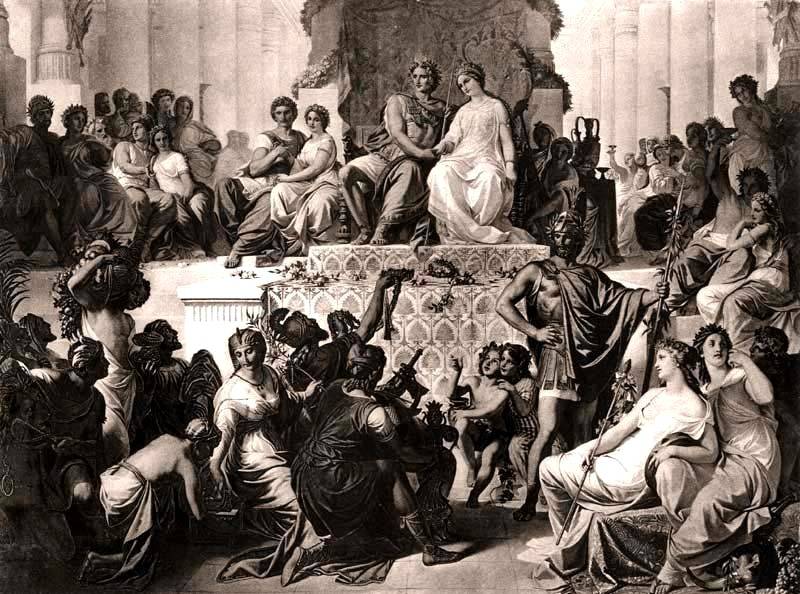
"Wedding in Susa". Painting by an unknown artist of the XIX century. Alexander and Stateira are depicted in the center, next to them are Hephaestion and the Persian princess Dripetida, Stateira's sister. After the death of Alexander, these girls were killed in Babylon on the orders of Roxana with the consent of the regent Perdiccas
Eumenes then got Artonis (Artonis) - the sister of Barsina, the mother of the illegitimate son of Alexander himself. It should be noted that only three participants in this wedding did not divorce their Persian wives after the death of the king. One of them was Eumenes.
Eumenes also participated in the multi-day feast arranged by Alexander in honor of Dionysus, after which the deadly illness of this king began and began to progress rapidly.
And the first participation of Eumenes in hostilities as a military leader was noted in 326 BC. e. during the Indian campaign.
Defenders of the Argead dynasty: Eumenes and Perdiccas
After the death of Alexander, his associates, with great difficulty and after long disputes, agreed to recognize Perdiccas as regent of the empire. He was a hipparch, that is
commander of the cavalry units of the Macedonian army. And it was to him that the dying king handed over his ring with a seal. A little later Perdiccas, on the advice of Eumenes, married Alexander's sister Cassandra. It is believed that Eumenes was a key figure in the negotiations between Alexander's associates, who categorically did not want to obey any of their former friends. It is curious that the cavalry units of the Macedonian army and the foot soldiers of the phalanx supported different parties in this confrontation.
This is how the Macedonian phalanx looks like in the drawing by Andrea Masochetti:
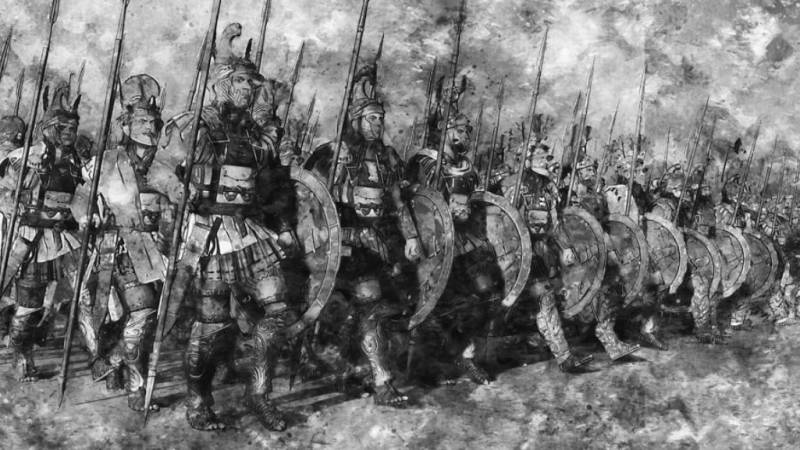
The Roman historian Cornelius Nepos later wrote:
And Plutarch can read that the phalanx of Alexander
And this is the image of a Macedonian cavalryman in the high relief of a Boeotian sarcophagus:
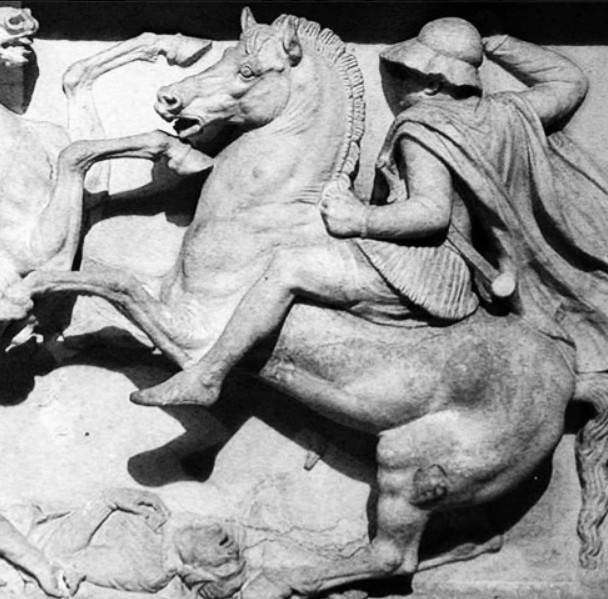
Eumenes, being a supporter of Perdiccas, nevertheless contributed greatly to the achievement of a compromise. Becoming chiliarch of Asia, Perdiccas appointed Eumenes as his successor as hipparchus. In addition, on the initiative of Perdikkas, Eumenes received one of the satrapies - Paphlagonia and Cappadocia - into administration.
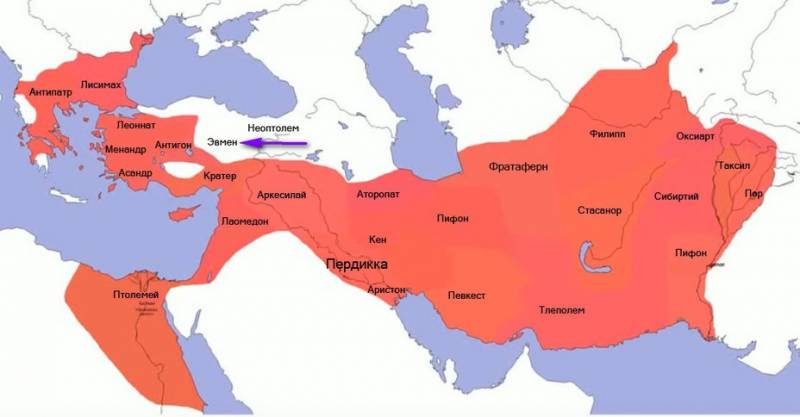
Distribution of Satrapies Perdikkoy
The problem was that these lands still had to be taken away from Ariarat, the satrap of Darius, who had entrenched himself in them, left in his former position by Alexander who conquered this province. Antigonus One-Eyed, the "neighbor" of Eumenes, who became the satrap of Cilicia and Great Phrygia (the western part of Asia Minor), and the satrap of Hellespontian Phrygia, Leonnatus, refused to help, the troops had to be allocated by Perdikka himself. Eumenes, who led them, conquered and pacified his region, quickly becoming a very popular ruler there. In a short time, he managed to create his own army.
Very soon, the Diadochi began to fight among themselves. The reason was given by Ptolemy Soter, who organized the abduction of the embalmed body of Alexander the Great, which was sent to Pella in a luxurious sarcophagus. Perdiccas organized a campaign against Egypt, but was killed in his tent after an unsuccessful attempt to cross the Nile, during which up to two thousand soldiers died. The conspiracy against him was led by Python and Seleucus. The question arose about the new regent of the empire, who, at a meeting of the army, was unexpectedly invited to become Ptolemy.
The fact is that he won universal gratitude by providing active assistance to former comrades in distress. However, Ptolemy by that time realized that it was no longer possible to save the state of Alexander, which was literally torn apart by the closest associates of this king. He preferred a “tit in hand” in the form of a self-sufficient Egypt.
Python became the new regent, and he was soon replaced by the strategist of Europe, Antipater, an old Macedonian commander who was a faithful companion of Alexander's father, Philip II. During the absence of Alexander, Antipater ruled Macedonia and won the war against Sparta and her allies (the decisive battle was the battle of Megapolis in 331 BC).
General and Diadochus
Meanwhile, Eumenes acted much more successfully than Perdiccas on his front. He defeated Ptolemy's allies in turn. The first to speak out against him was his own subordinate, the governor of Armenia, Neoptolem. In the army of Alexander the Great, he commanded an elite detachment of argyraspides - warriors who were awarded silver-plated shields for high valor before going to India.
The battle of Eumenes and Neoptolemus was the first in which the famous Macedonian phalanx was defeated, fighting against the antitagma - an army recruited from the eastern peoples of the conquered provinces (the idea of \uXNUMXb\uXNUMXbcreating such detachments belonged to Alexander the Great). One of the commanders of the antitagma cavalry was Pharnabaz, the brother of Artonis, the wife of Eumenes, and Barsina, who gave birth to a son from Alexander. In the center of the phalanx, Neoptolemus really overturned the foot soldiers of Eumenes, but the Greek was well aware of the weaknesses of this system. His cavalry units defeated the flanks of the opposing army and captured the enemy convoy. After that, the Macedonians of the phalanx not only surrendered, but even went over to the side of Eumenes.
Within 10 days, the army of Crater, perhaps the most authoritative and beloved commander of the Macedonian army, entered Cappadocia. He was one of Alexander's two closest friends, as well as a personal friend of Eumenes himself. At the same time, Crater condemned the Asian policy of Alexander, who wanted the Macedonians and Greeks to come closer to the Persians and other conquered peoples, which greatly increased his authority in the troops.

This is how Crater was seen by the audience of Oliver Stone's film "Alexander", 2004.
More recently Crater, Antipater, Leonnatus and Cleitus the White defeated the rebellious Greeks in the Lamian War.
Among others, more than 11 thousand hitherto invincible veterans of Alexander the Great were in the troops of Crater. But now, at the battle of the Hellespont, they were defeated by the army of Eumenes.
Krater was sure that none of the Macedonians would dare to attack him. He seriously hoped that the warriors of Eumenes would go over to his side, and therefore, in order to be recognized, he did not put on a helmet. But Eumenes directed against him the cavalry of the antitagma, one of whose horsemen inflicted a mortal wound on him.
Participated in this battle, commanding the left flank, and previously defeated by Neoptol. He died in a duel with Eumenes, and Plutarch gives a description of this battle, worthy of becoming an episode of some heroic poem:
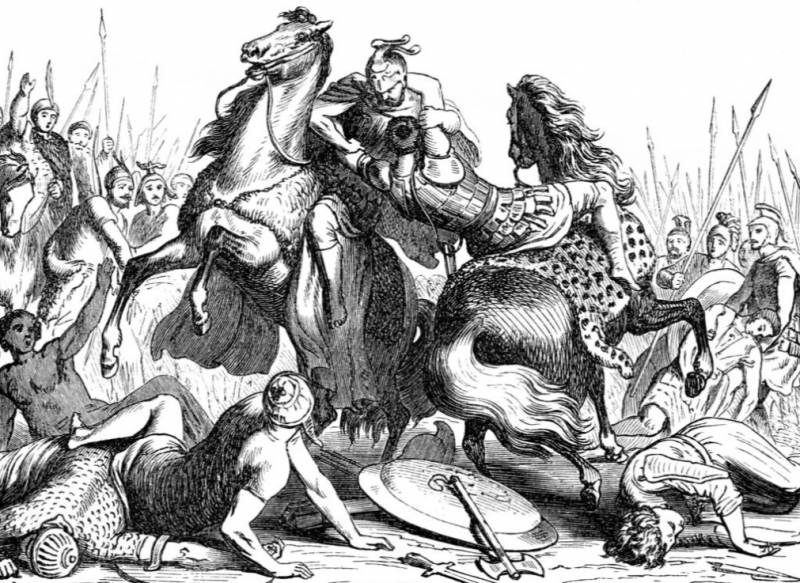
Battle of Eumenes of Cardia and Neoptolemus during the Battle of the Hellespont. Engraving from 1878
Thus, Eumenes unexpectedly became one of the most prominent commanders of his time, which greatly frightened his enemies. The former associates of Alexander the Great did not like the upstart Greek anyway, but now they realized that they had received a serious opponent with whom they would have to reckon with and negotiate.
So, Neoptolemus and Eumenes are shown by Plutarch as old and irreconcilable enemies. But the death of the Eumenes Crater was very saddening. There were two reasons.
Firstly, Krater was his friend - one of the few close associates of Alexander in the environment.
Secondly, Eumenes understood that both the other Diadochi and the Macedonian veterans of the death of Crater would not forgive him. And so it happened: after receiving the news of the death of Krater, the enemies of Eumenes tried to ensure that he was sentenced to death in absentia at a meeting of the army. Because, as Plutarch says:
In general, the words of Crater turned out to be prophetic, who, according to legend, dying, said that victory over him would bring Eumenes both respect and hatred.
In the next article, we will continue the story of Eumenes. Let's talk about his war with Antigonus One-Eyed and his allies - Seleucus Nicator and Python, the betrayal of the Argyrospids and the sad fate of the last defender of the Macedonian Argead dynasty.
Information